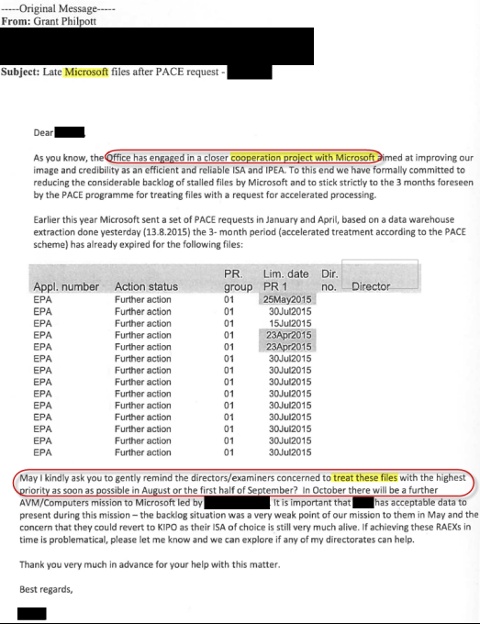

WE HAVE already covered countless privacy abuses at the EPO (more than we can recall and enumerate, but the wiki has a whole category/colour scheme for illegal surveillance at the EPO). Nobody was ever prosecuted for any of these abuses. Benoît Battistelli, had he enjoyed no diplomatic immunity, would even face a prison sentence for some of these abuses, which were severe at times. António Campinos is repeatedly being reminded by staff that some of the practices adopted during lockdown are downright and outright illegal; he consequently appointed as a data 'something' officer an old friend or colleague of his (also indebted for getting that high-paying job), so it's obviously just face-saving cover-up, not a genuine effort at respecting privacy laws.
"Later they wonder why people get angry and vote to leave the EU..."This is so typical at the EPO. They commit crimes, then they appoint friends of theirs to look the other way or to somehow justify that. The longer it goes on for, the worse it'll get. They have the equivalent of crime/accountability 'debt'; they're amassing endless abuses and they even bribe large publishers to not write about those things. Later they wonder why people get angry and vote to leave the EU...
 A couple of months ago the Central Staff Committee wrote: "Trust and openness in the exchanges among the members of the Divisions are essential for the good quality of the work in examination and opposition proceedings. Sometimes, individual team managers or directors misuse information that examiners exchange confidentially during their deliberations, e.g. for reporting purposes. In this open letter to the President, we suggest that the Office should take all necessary steps to ensure that the software is configured In such a way that only the members of the Divisions have access to the written information they exchange during their deliberations. We also have doubts whether the software complies with our EPO data protection guidelines."
A couple of months ago the Central Staff Committee wrote: "Trust and openness in the exchanges among the members of the Divisions are essential for the good quality of the work in examination and opposition proceedings. Sometimes, individual team managers or directors misuse information that examiners exchange confidentially during their deliberations, e.g. for reporting purposes. In this open letter to the President, we suggest that the Office should take all necessary steps to ensure that the software is configured In such a way that only the members of the Divisions have access to the written information they exchange during their deliberations. We also have doubts whether the software complies with our EPO data protection guidelines."
Here's that letter in full:
Reference: sc20141cl-0.3.1/1.2.2 Date: 25.09.2020
European Patent Office | 80298 MUNICH | GERMANY
Mr António Campinos President of the EPO
ISAR - R.1081
OPEN LETTER
Patent Workbench: confidentiality of deliberations
Dear Mr President,
Trust and openness in the exchanges among the members of the Examination and Opposition Divisions are essential for the good quality of the processing of patent applications and oppositions and the results of the examination and opposition proceedings1.
At present personal consultations in the Divisions are made considerably more difficult due to the currently increasing use of teleworking and the paperless processing of files. To a large extent the necessary exchanges therefore take place with electronic means. The current official software (Patent Workbench, (q/pwb or q/tasklists)) electronically implementing the workflow of the decision-making process in the Divisions provides the feature that each Division member can store in the respective electronic file a text comment visible to all members. In particular, a member can communicate his doubts or objections against a proposal for the grant of a patent in the comment field provided for this purpose.
In principle, there would be no objection to such a form of communication within the competent Division, provided that the confidentiality of the deliberations is guaranteed in all cases (see also Decision of the Board of Appeal, T305/01, reason 5.3)2.
____ 1 For example the Enhancing Collaboration (ECo) Project under SP2023, Goal 3, aims to build up an enhanced collaboration system along the Patent Granting Process, promoting a culture of continual improvement and contributing to improving the quality of our products (see Project Description in the Project Brief 3.2.1.04 Enhancing Collaboration). 2 In T305/01, reason 5.3 the Board held that "third parties including a (prospective) opponent have no right to know the reasoning which led the examining division to grant the patent, such right being also in conflict with confidentiality of deliberation."
Unfortunately, the text comments are not only accessible to the members of the Divisions but also at least to the team managers and directors. Sometimes, individual team managers, being aware of the text comments, have interfered in the debate within the Division and in the decision-making process and have expressed their judgment, for example on the quality of the work of individual Division members. They thus greatly disturbed the atmosphere of trust and cooperation between the members of the Division.
We are therefore concerned that the current software does not seem to meet the prescribed requirement of confidentiality of the deliberations within the Divisions, and that good and trustful cooperation among the members of the Divisions is thus at stake. We believe that this could impair the ability of the Divisions to work and fulfil their tasks properly and also deteriorate the examiners' confidence in their team manager and/or director. Also line managers could be tempted to take the comments into account for reporting purposes. We also doubt that the software meets our own EPO data protection requirements.
We would therefore kindly ask you to take immediately all steps to ensure that the software is configured so that only the Division members can access the comments and that any third parties, including team managers, directors and others, are denied access. In addition, the software should be amended such that the text comments are deleted immediately after the decision has been made.
Furthermore, we would like to ask you to have the software checked by the Data Protection Officer to ensure that it complies with data protection requirements.
We would appreciate being informed as soon as possible of the steps and recommendations taken, if any. If you have any further questions, please do not hesitate to contact us at any time.
Yours sincerely,
Alain Dumont Chairman of the Central Staff Committee